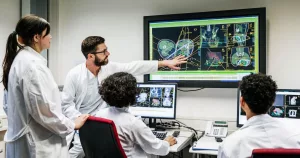Having attained 100 million active users in just two months since its release, ChatGPT has broken the record for the “fastest-growing user base.” While ChatGPT has been met with worldwide approval, criticisms regarding the impending threat of malicious use of Chatbots, such as ChatGPT, have been increasing. Even Sam Altman, the CEO and CFO of Open A.I., (the company that launched ChatGPT) has expressed his concerns, saying that “these models could be used for large-scale disinformation.”
Geoffrey Hinton, a pioneer of A.I., recently told the New York Times that he left his decade-long employment at Google this month. Since this, his voice has joined the growing criticisms regarding the development of A.I. “I console myself with the normal excuse: If I hadn’t done it, somebody else would have,” Dr. Hinton told the New York Times.
Often referred to as “the Godfather of A.I.,” in 2012, Dr. Hinton created the basis for the intelligence of A.I. systems in collaboration with two graduate students from the University of Toronto. This foundation has since been used to develop powerful platforms, such as ChatGPT and Google Bard, Google’s own language-powered chatbot. One of such students that collaborated with Dr. Hinton in the starting stages of A.I. development, Ilya Sutskever, has since become Chief Scientist for Open A.I.
Geoffrey Hinton, a 75-year-old academic, has spent his entire career working on the development of A.I. His work on neural networks (mathematical algorithms that learn to perform tasks by analyzing data) started during his time as a graduate student at the University of Edinburgh. He has since become a professor of computer science and won the Turing Award with his two students for their advancement of neural networks in 2018, before beginning his position at Google for A.I. development. As such, Dr. Hinton has dedicated his life to the evolution of A.I. programs.
More recently, Dr. Hinton left his job at Google to openly criticize the direction of A.I. without affecting the company internally. In a tweet, Dr. Hinton wrote: “I left so that I could talk about the dangers of AI without considering how this impacts Google. Google has acted very responsibly.”
In an interview with the New York Times, Dr. Hinton conveyed his fears regarding A.I. He has communicated his fear that A.I. could be used to spread false information, as well as fake photos and videos. This could amplify the already-existing threat of disinformation in the digital sphere.
Furthermore, Dr. Hinton expressed that with their fast development, A.I. tools may soon take over various jobs, especially affecting so-called “drudge work” jobs, such as paralegal or assistant positions. He indicated that A.I. “might take away more than that.”
Dr. Hinton explained that only “[a few people believed] the idea that his stuff could actually get smarter than people.” However, given the pace at which A.I. has developed in recent years, Dr. Hinton expressed that he “no longer [thinks] that.”
Cover image by: Chloe Ellingson for the New York Times







